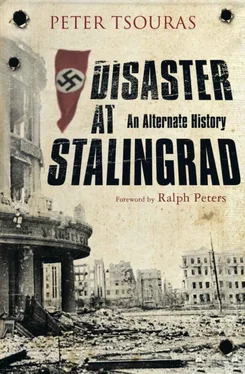Manstein did not know that the men of 6th Panzer as they broke into the pocket were shouting their division motto to the benumbed survivors of Seydlitz’s army, ‘Raus zieht heraus!’
10.25, 6th Army HQ. Northern front of pocket holding. Directing LX Panzer Corps to attack enemy in direction of Kalach.
12.10, LX Panzer Corps HQ. Panzer Corps passing through 6th Army to continue attack against enemy 5th Tank Army.
14.44, 11th Army HQ. XXX Corps attacking flank of enemy 24th Army. LIV Corps attacking enemy rear. Enemy appears to be panicking. Very few enemy tanks in this sector.
16.35, 6th Army HQ. Major tank battle in progress.
That tank battle was the epic clash between the panzers of Raus, Hörnlein and Kempf and those of Vatutin’s 26th Tank Corps and 8th Cavalry Corps. Overhead the air forces filled the sky and rained down disintegrating or flaming aircraft as the struggle in the air was as intense as that on the ground. Zhukov took personal command of this battle and committed the Southwest Front reserve, 1st Mechanized Corps. Even that was not enough.
The German panzer commanders had thrust into the Soviet positions and then gone over to the defence. The enemy threw in wave after wave of tanks backed by entire rifle divisions. Raus never forgot the scene:
Thousands of Russians filled the snowfields, slopes, and depressions of the endless steppe. No soldier had ever seen such multitudes advance on him. Their leading waves were thrown to the ground by a hail of high explosive shells, but more and more waves followed. 19
Here the superior gunnery skills and optics as well as the powered turrets made the German T-34s such killing machines that they never were in Soviet hands. Artillery from 6th Army’s replenished guns joined the fight as well while the war lover Rudel showed up with his squadron to join the battle as did other squadrons of Stukas and Ju 88s.
Sergeant Alexei Petrov was overwhelmed by the massive shelling and air attack:
To Petrov it was worse than Stalingrad… On the flat plain were thousands of bodies, tossed like broken dolls onto the ground. Most were Russians… At the height of the bombardment Petrov saw a tiny figure no more than three feet high.
It was the upper torso of a body of a Red Army man. His hips and legs had been severed by a shell burst and lay beside him:
The man was looking at Petrov and his mouth opened and closed, sucking air, trying to communicate one last time. Petrov just stared at the poor creature, until the arms stopped flailing, the mouth slackened and the eyes glazed. Somehow the soldier’s torso remained upright and forlorn beside the rest of his body. 20
Into this chaos 6th Panzer lurched forward with 150 tanks, cutting through the Russian masses. Raus’s assault-gun battalion attacked on a parallel axis cutting off large numbers of the enemy between them:
Even the strongest nerves were unequal to this eruption of fire and steel. The Russians threw their weapons away and tried like mad men to escape the infernal crossfire and the deadly armoured envelopment. This was a thing that rarely happened in World War II. In mobs of several hundreds, shelled even by their own artillery and their own rocket launchers, they ran… towards the only open spot, only to find detachments of panzergrenadiers in their way to whom they surrendered. 21
As the panzers sliced through the collapsing Soviet forces, 11th Army was completing its wheel northwestward to cut the supply lines of Don Front and pushing its 65th and 24th Armies back towards the Don, joining the broken 5th Tank Army and 21st Army of Southwest Front. 22
Kalach, 10 November 1942
By the next morning there was a massive traffic jam as the Soviet armies were feeding into the single bridge over the Don at Kalach, desperate to escape the Germans. German artillery and the Luftwaffe followed the horde, killing large numbers and sowing more panic. They were packed so tight that every shell and bomb found a target. NKVD troops trying to control the roads to the bridge were shot down as men rushed to cross. All this time the bridge received the unrelenting attention of the Luftwaffe’s dive-bomber squadrons. Between their attacks, the Me 109s would make strafing runs, their bullets stitching a bloody trail through the crowds packing the bridge, exploding supply trucks, until no one could get through. But the mobs heaved and pushed their way over the dead, pushing burning vehicles over the side to crash through the ice in the Don with a loud crack and hiss as they sank. The end to escape came when finally a well-aimed bomb dropped a span. Still the crowds pushed forward spilling the men in front over the broken edge of the bridge to splatter on the ice below.
Along the banks thousands of men attempted to cross the ice. Hundreds fell through, but many more found ways across where the ice had frozen thickly enough to carry their weight. To the north more thousands followed the bank itself to find the bridge at Akimovka, where the German XI Corps had streamed across in the other direction in the same sort of panic flight.
But for the four armies packed into the approaches to Kalach, there was no escape. Over the next few days, the Germans would count over 200,000 prisoners.
The Kremlin, Office of the General Secretary of the Communist Party of the USSR, 11 November 1942
Stalin knew the game was up and sank into that same depression that had sent him to his dacha after the German invasion of 22 June the year before. Now he just sat in his Kremlin office and stared at the walls. Frantic calls from Zhukov and Rokossovsky went unanswered. Abakumov and the delegation from the Politburo found him there. He said, ‘I did not summon you.’
Khrushchev answered, ‘No, that is not the normal procedure when someone is about to be arrested.’
Stalin jerked upright. The old look of overwhelming malevolence filled his face, that look that had quailed so many others, that look that spoke death. Khrushchev’s jaw dropped. Another man simply voided himself in terror. A shot made them all jump. Stalin flew backwards into his chair and fell like a rag doll onto the floor. Abakumov held a smoking pistol. ‘I warned you all. A bullet is much safer than an arrest warrant.’ He turned his own cruel face on them, then went over to Stalin’s desk, kicked the body aside, righted the chair, and sat down.
CHAPTER 15
Coda

Brest-Litovsk, Ukraine, 22 November 1942
Vyacheslav Molotov’s stony expression masked an acid hatred. That he, the Soviet Foreign Minister, had to come to beg terms from the fascists was enough to make him gag. But the Germans, being what they were, could not help but heap indignity on the Soviet delegation. The gloating expression of his counterpart, Joachim Ribbentrop, that loathsome bully, made him want to leap across the table and throttle him.
Ribbentrop greeted Molotov with a smirk, ‘We meet again, Herr Molotov.’ The Russian ground his teeth. Their last meeting had been to sign the notorious German-Soviet nonaggression treaty of 1939 that allowed Stalin to gobble up the Baltic republics and share in the conquest of Poland. Then they had been equals. Now, the Russians had come as supplicants.
The Germans could not help gloating, a national characteristic. They knew that the death of Stalin at the hands of the NKVD had cast the apple of discord among the Soviets, with Red Army and secret police units in open combat in Moscow itself. The war itself had ground to a halt as the Germans prepared to gather the fruits of victory from a broken foe and the Russians were consumed by a growing civil war. To stir the pot more they had released General Vlasov and his followers to wage his anticommunist crusade. 1
Читать дальше













